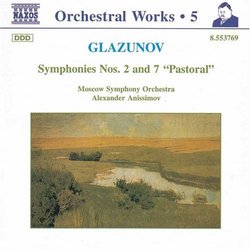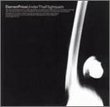| All Artists: Alexander Glazunov, Alexander Anissimov, Alexander Annissov, Moscow Symphony Orchestra Title: Glazunov: Symphonies Nos. 2 & 7 Members Wishing: 0 Total Copies: 0 Label: Naxos Release Date: 4/8/1997 Genre: Classical Style: Symphonies Number of Discs: 1 SwapaCD Credits: 1 UPC: 730099476928 |
Search - Alexander Glazunov, Alexander Anissimov, Alexander Annissov :: Glazunov: Symphonies Nos. 2 & 7
 | Alexander Glazunov, Alexander Anissimov, Alexander Annissov Glazunov: Symphonies Nos. 2 & 7 Genre: Classical
|
Larger Image |
CD DetailsSimilar CDsSimilarly Requested CDs
|
CD ReviewsEntertaining Russian romanticism Evan Wilson | Cambridge, Massachusetts United States | 11/03/2000 (4 out of 5 stars) "Glazunov's eight symphonies (there is one movement from a projected 9th symphony) are somewhat of a mixed bag. They sound like a cross of the Russian romanticism of Rimsky-Korsakov with the emotionalism of Tchaikovsky. But, Glazunov was a facile composer who sometimes relied more on his formidable technique than on inspiration. The results, therefore, range from the wonderful spontineity of his precocious 1st symphony to the absolutely turgid 8th which lacks a single inspired bar.This unevenness has apparently affected conductors, because there is no complete cycle by any conductor that is totally compelling. The recently completed Naxos series with Alexander Anissimov conducting the Moscow Symphony is an excellent example of this trend. One coupling in this series (Syms. 1 & 4) is an outright failure. Another (Sym. 6 with a filler) is pretty good, but not spectacular. The 3rd symphony is given about the best performance one can expect for such a monster, but the conductor trudges through the uninspired movement for the 9th symphony. The most recent (Syms. 5 & 8) finds the conductor interested in 5 and understandably bored by 8.The best of the series is the one under review. Here Anissimov glories in the colors of these pieces and keeps things moving along. Both pieces contain wonderful themes and that bright Russian orchestration which makes pieces like the "Russian Easter Overture" of Rimsky Korsakov a joy. Still, even here it appears that Anissimov is not totally sold on the quality of the music. Glazunov needs a conductor who will bull through the flat patches with flair AS IF they were great music. Instead, Anissimov seems to get bored with these patches. His conducting goes slack and the orchestra follows him, losing the pulse that carries phrases along. Worse, (and this occurs throughout the cycle) Anissimov often appears to have no idea where the harmony is going. As a result, the sense of a journey from beginning to end that is such a part of symphonic writing is lost. To sum up, if you want a cheap introduction to the symphonies of Glazunov, this is the disk to get. You will certainly enjoy what you hear. However, we're still awaiting a conductor who will get to the heart of this music, so tread carefully when exploring the available recordings of Glazunov's other symphonies. At some point, though, if you like this you'll want to hear #s 1, 4 & 5 which encapsulate the best Glazunov had to offer symphonically. His Violin Concerto and the ballet The Seasons are also worthy of your attention and there are many better recordings of those pieces." OK music from an orchestral master Newton Ooi | Phoenix, Arizona United States | 02/02/2008 (2 out of 5 stars) "Glazunov, like many of his time such as Dvorak and Schubert, composed 9 symphonies out of respect for the master Beethoven. Unlike Beethoven, each subsequent symphony does not get better than the previous ones. Specifically, Glazunov's best was his first, followed by his 4th, 5th, and 6th in close order. Neither the 2nd or 7th symphonies are very memorable. Both sound distinctly Romantic in melody and tone, but neither has the drama, beauty or richness of the 1st or 6th. Each has one great part; the first movement of the 7th symphony and the last movement of the 2nd symphony are quite good. Each symphony is a standard orchestral work; four movements per symphony, with each movement having a distinct sound. The sound quality is great, as expected from Naxos, but the music is only OK. In all, not worth the new price, but if you can get this album used and cheap, it is worth it for a Russian Romance music fan."
|

 Track Listings (8) - Disc #1
Track Listings (8) - Disc #1










